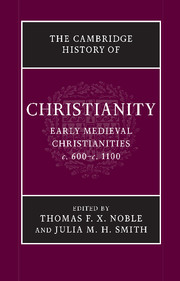Book contents
- Frontmatter
- Introduction: Christendom, c. 600
- Part I Foundations: Peoples, Places, and Traditions
- Part II Christianity in Confrontation
- 7 Christians and Jews
- 8 The Mediterranean Frontier: Christianity face to face with Islam, 600–1050
- 9 Christians under Muslim rule
- 10 Latin and Greek Christians
- 11 The northern frontier: Christianity face to face with paganism
- Part III Christianity in the Social and Political Order
- Part IV Christianity as Lived Experience
- Part V Christianity: Books and Ideas
- Conclusion: Christendom, c. 1100
- Bibliographies
- Index
- References
9 - Christians under Muslim rule
from Part II - Christianity in Confrontation
Published online by Cambridge University Press: 28 March 2010
- Frontmatter
- Introduction: Christendom, c. 600
- Part I Foundations: Peoples, Places, and Traditions
- Part II Christianity in Confrontation
- 7 Christians and Jews
- 8 The Mediterranean Frontier: Christianity face to face with Islam, 600–1050
- 9 Christians under Muslim rule
- 10 Latin and Greek Christians
- 11 The northern frontier: Christianity face to face with paganism
- Part III Christianity in the Social and Political Order
- Part IV Christianity as Lived Experience
- Part V Christianity: Books and Ideas
- Conclusion: Christendom, c. 1100
- Bibliographies
- Index
- References
Summary
By the year 732 CE, just one hundred years after the death of the prophet Muhammad, Arab military forces, in the name of Islam, consolidated their hegemony over a large stretch of territory outside of Arabia. This expanse of territory, embracing major portions of the Roman and Persian empires of Late Antiquity, included many indigenous Christian communities, in several denominations. They all came under Muslim rule, but demographically they made up the religious majority in many places until well into the eleventh century. There were strong Christian communities in Spain (al-Andalus) and in the territories of the former eastern patriarchates of the Roman Empire, as well as in Persian Mesopotamia. During the first four centuries of the hegira (i.e., the Islamic era) most of these Christian subjects of the Muslim caliph gradually adopted the Arabic language, while retaining to a greater or lesser extent, depending on local circumstances, their traditional, patristic, and liturgical languages for church purposes.
Christians in the Qur’ān and in early Islam
Arabic-speaking Christians were in the audience to whom the Qur’ān first addressed the word of God, as it claimed, in “a clear Arabic tongue” (Qur’ān 16.103 and 26.105). Indeed the Qur’ān presumes the priority of the Torah and the Gospel in the consciousness of its hearers, and insists that in reference to the earlier divine revelations it is itself “a corroborating scripture in the Arabic language to warn wrong doers and to announce good news to those who do well” (Qur’ān 46.12). In the Qur’ān, God advises the Muslims, “If you are in doubt about what we have sent down to you, ask those who were reading scripture before you” (Qur’ān 10.94).
- Type
- Chapter
- Information
- The Cambridge History of Christianity , pp. 197 - 212Publisher: Cambridge University PressPrint publication year: 2008
References
- 2
- Cited by



